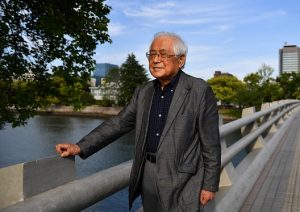Hiroshima Voices: “No Nukes, No War” Takashi Hiraoka, 95, A-bomb survivor, Nishi Ward, Hiroshima
May 17, 2023
Rather than promote division, ease tensions
by Kyosuke Mizukawa, Staff Writer
In 1991, after a career as a reporter at the Chugoku Shimbun and as president of RCC Broadcasting, Takashi Hiraoka became mayor of Hiroshima, ultimately serving two terms over the course of eight years. In 1995, during his time as mayor, he delivered an appeal to the International Court of Justice (ICJ), a body that was deliberating at the time on the illegality of the use and threat of use of nuclear weapons. Mr. Hiraoka declared to the court that the use of nuclear weapons was “a clear violation of international law,” illustrating his point by touching on the experiences of A-bomb survivors.
Click here to view the video
The people of Hiroshima have always spoken out against war. With the summit meeting of the G7 (Group of Seven industrialized nations) being held here in the city, I ask the summit participants to discuss real steps toward easing tensions. I truly hope the summit is not used to escalate the war or promote further division.
With regard to the Ukraine issue, the G7 leaders should demand that the war be stopped immediately. Hiroshima’s basic stance is the deep regard for human life. I want leaders at the meeting to discuss concrete steps toward a ceasefire. The United States is attempting to isolate China. What is needed now, however, is consideration of how to eliminate the seeds of tension and war through diplomatic means.
Experiencing the devastation brought about by the use of an atomic bomb, Hiroshima has always emphasized the futility of reliance on the weapons. If nuclear weapons were ever to be used again, that would lead to the destruction of humankind. The only way to get rid of nuclear weapons is to ease the tensions through dialogue and negotiations among nations. Peace can only be maintained by promotion of mutual understanding, not by force.
If the G7 leaders were to meet with A-bomb survivors and visit the Hiroshima Peace Memorial Museum, they would be able to grasp the terrible consequences of nuclear weapons. The United States should admit that its strategy of dropping the atomic bombs on Hiroshima and Nagasaki was wrong. So long as the United States continues to justify its use of nuclear weapons, Russia has the perfect excuse. To prohibit Russia from using nuclear weapons, the United States needs to say to Russia, “We were wrong; don’t make the same mistake.”
During the nuclear age, the number of nuclear victims around the world has increased dramatically. The G7 Hiroshima Summit will be attended by leaders from the United States, the United Kingdom, and France, all countries that have carried out nuclear testing. From the meeting venue of Hiroshima, a concrete proposal should be made to the United Nations to create a fund for support of such nuclear victims around the world. In fact, Article 6 of the Treaty on the Prohibition of Nuclear Weapons (TPNW) stipulates just such aid for nuclear victims.
On the other hand, if the language coming out of the Hiroshima Summit serves to escalate the war or promote further division, faith and confidence would be lost in Hiroshima’s future proclamations to the world about peace. Hiroshima’s fundamental identity is the desire to achieve peace for all of humanity by transcending national boundaries. With that in mind, the G7 Hiroshima Summit must serve as a venue for opening a path to peace.








